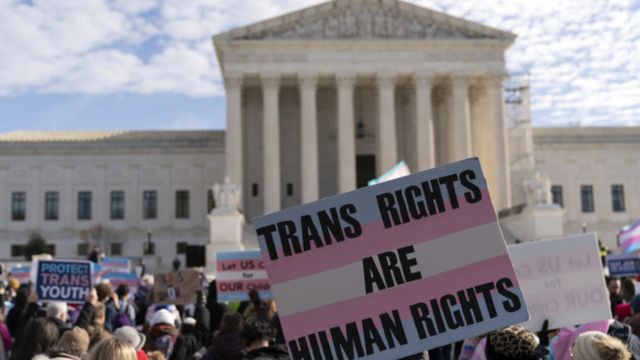Transgender rights suffered a significant setback on Wednesday when the Supreme Court upheld a Tennessee law that limits gender transition care for minors.
Since 24 other states have already passed legislation akin to Tennessee’s, which prohibits hormone therapy, puberty blockers, and gender transition surgery for minors, the 6-3 decision is probably going to have a significant effect.
It now appears that those laws will withstand comparable legal challenges. States without such prohibitions are unaffected by the ruling, so care will continue to be accessible in those states.
With the three liberals dissenting and the six conservatives in the majority, the court was split along ideological lines.
Chief Justice John Roberts, who wrote the majority opinion, came to the conclusion that the Tennessee law does not amount to sex discrimination in a way that would be in violation of the 14th Amendment to the Constitution.
“This case carries with it the weight of fierce scientific and policy debates about the safety, efficacy, and propriety of medical treatments in an evolving field,” Roberts stated. “The voices in these debates raise sincere concerns; the implications for all are profound.”
“The Equal Protection Clause does not resolve these disagreements,” he continued.
In contrast to the majority’s conclusion, liberal Justice Sonia Sotomayor stated in a dissenting opinion that the law does discriminate on the basis of both sex and transgender status and should be carefully examined.
“By retreating from meaningful judicial review exactly where it matters most, the court abandons transgender children and their families to political whims,” she stated. “In sadness, I dissent.”
In addition, Sotomayor made the comparatively uncommon move of reading a courtroom summary of her ruling from the bench, stating that the decision’s implications are “incredibly dangerous.”
Advocates for trans rights have cautioned that a decision permitting prohibitions on care for trans minors may open the door for comparable limitations on adults.
“Today’s ruling is a devastating loss for transgender people, our families, and everyone who cares about the Constitution,” read a statement from the challengers’ attorney, Chase Strangio of the American Civil Liberties Union.

Jonathan Skrmetti, the attorney general for Tennessee, praised the ruling as a victory for “common sense over judicial activism.”
Furthermore, he stated that lawmakers ought to conduct “careful scrutiny” prior to permitting such treatments, rendering decisions “based on science, not ideology.”
Transgender teenagers and their families, along with the administration of former President Joe Biden, filed the lawsuit.
Read Also: Judge Sides With Trans, Nonbinary Individuals in Passport Gender Marker Case
Since the ruling did not address a separate argument under the 14th Amendment that the laws violate parents’ right to make health care decisions for their children, it does not address all legal issues pertaining to the state bans.
Additionally, the court did not rule on whether laws that discriminate against transgender people should be given “heightened scrutiny,” which means that judges should examine them critically. However, according to three conservative justices, transgender individuals are not a “suspect class,” so laws that target them shouldn’t be given extra attention.
Laws prohibiting transgender girls from playing sports are among the other transgender rights issues that will probably make it to the court eventually.
President Donald Trump began reversing Biden’s transgender rights-promoting policies as soon as he took office in January. He signed an executive order that, among other things, aims to limit the availability of gender-affirming care for adolescents across the country. It was promptly blocked by a judge.
Additionally, Trump has placed additional limitations on transgender military personnel.
The Tennessee law, which was passed in 2023, is one of several similar laws that states have passed restricting gender transition treatments. The state’s attorneys cited comparable actions in other nations, including Europe, to support their ban.
Read Also: Thousands Could Die Under Proposed Medicaid Cuts, Researchers Say
In court documents, Skrmetti highlighted the growing discussion about the best ways to care for children with gender dysphoria, the clinical term for the distress people can feel when their gender identities don’t match the genders they were assigned at birth.
Gender dysphoria can be effectively treated with gender-affirming therapies, according to major medical organizations.
The challengers contended that because the treatments in question—hormone therapy and puberty blockers—can be used in other contexts, the law constitutes sex discrimination and violates the equal protection clause of the 14th Amendment.
Since the court unexpectedly decided in 2020 that federal employment protections cover both gender identity and sexual orientation, this case represents the most important decision on transgender rights.
After the Cincinnati-based 6th U.S. Circuit Court of Appeals dismissed challenges to the Tennessee law and a comparable measure in Kentucky in 2023, the case made its way to the Supreme Court.
After determining that the plaintiffs lacked the legal standing to contest the surgery ban, a district court judge blocked portions of the law. The Supreme Court did not consider that part of the law to be in question.



